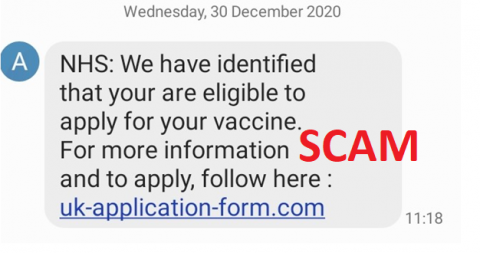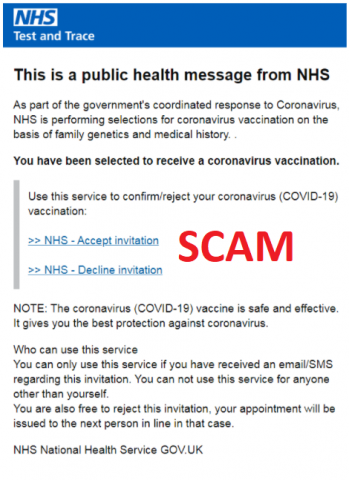Scamwatch is warning Australians of scams relating to COVID-19 vaccinations in Australia and overseas that may attempt to gain your personal information and lead to financial loss.
How to avoid a vaccination scam
- Don’t give personal information to someone who calls you about the vaccine.
- Don’t click on links in unexpected emails or text messages.
- Don’t pay to get on a vaccination list – COVID-19 vaccines will be free for everyone living in Australia.
- Don’t pay for early access to a vaccine – you can’t pay for early access.
- You will not need a prescription from a GP to get vaccinated.
If you are asked for any of these by someone claiming to provide COVID-19 vaccines, it is a scam.
Be careful when you get unexpected contact or messages – remember, scammers can impersonate the government too. Always source phone numbers independently from official government websites.
Protecting your personal information
Scammers may try to obtain your personal information by claiming it is required for you to get the COVID-19 vaccine.
Don’t give personal information to anyone who calls you about the vaccine. Vaccine offers that ask for personal or financial information are scams.
If you receive unexpected emails or text messages about the vaccine, don’t click on any links. They may contain malware and give your personal information to a scammer.
Other vaccine scams that Scamwatch is aware of include offers to pay money as an investment opportunity in the Pfizer vaccine and fake surveys related to the vaccine.
These surveys offer a prize or even early access to the vaccine for their completion. In reality, the surveys are after your personal or financial information.
COVID-19 vaccination proof in myGov, Medicare and My Health Record
You may need proof of your COVID-19 vaccination.
You will be able to access proof of vaccination through Medicare Online via myGov, the Medicare Express Plus app or your My Health Record.
Key information on demonstrating that proof is provided is available on the Services Australia website.
If you are using your myGov and Medicare accounts, ensure your personal information is safe.
No one legitimate will request your myGov sign-in details, or request you to sign into your account while they are watching your screen.
How vaccines will be distributed
It’s important to be aware of how vaccines will be delivered to Australians.
Initially vaccines will be delivered through vaccination clinics run by states and territories. If you are in residential aged care or disability care, residents will receive vaccines through teams attending care facilities.
If someone offers to mail you a vaccine, it is a scam.
More information on the distribution of COVID-19 vaccines is available on the Department of Health website.
Get your information from reliable resources
Ignore unreliable information and only get your vaccine info from a trusted source like the Department of Health website or qualified medical professionals.
You can learn more about COVID-19 vaccines on the Department of Health website.
If you need information about COVID-19, COVID-19 vaccines or help with the COVIDSafe app, call the telephone number 1800 020 080. This number operates 24 hours a day, 7 days a week.
Members of the public and health professionals can also use the COVID-19 vaccine enquiries form to submit an enquiry relating to COVID-19 vaccines.
COVID-19 vaccination scams outside Australia
There are a range of vaccine scams being reported around the globe. Some of these include:
- selling fake vaccine appointments
- administering fake vaccines door to door for payment
- asking for participation in fake vaccine surveys
- asking for payment to ship vaccines to consumers
- charging for a pre-test prior to getting a vaccine
- putting your name on a waiting list to get a vaccine.
Text messages impersonating the government
The following text was circulated in the United Kingdom at the time of their COVID-19 vaccination rollout.

Emails impersonating the government
The following email has been received by Australians though it is targeted at residents of the United Kingdom.

Have you been scammed?
We encourage you to report scams to the ACCC via the report a scam page. This helps us to warn people about current scams, monitor trends and disrupt scams where possible.
We also provide guidance on protecting yourself from scams and where to get help.



